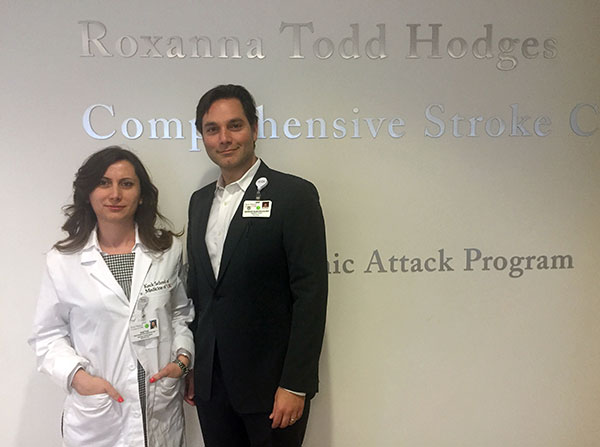
Yekaterina Hovhannisyan, MD and Nerses Sanossian, MD
When Yekaterina Hovhannisyan, MD arrived in Los Angeles in November from Yerevan, Armenia, she was prepared for an intensive learning experience at the Keck School of Medicine of USC.
Hovhannisyan, a neurologist and junior faculty member at the Yerevan State Medical University, was at the USC Comprehensive Stroke and Cerebrovascular Center as part of an ongoing project between neurologists of Armenian descent from the US and Canada to improve stroke patient outcomes in that part of the world.
“I am here to increase understanding of the organization of stroke patient management, and to try to improve the quality of care for stroke patients,” she explained. “I want to improve stroke patient care throughout all of Armenia.”
Hovhannisyan has been working closely with Nerses Sanossian, MD, associate professor of neurology at the Keck School, touring the intensive-care unit and conducting research that they will present together.
Her two-month visit is what both doctors hope is the first of many exchanges between the two countries. Sanossian would like the program to continue in perpetuity, bringing a greater understanding of patient care to the Keck School as well as the Armenian healthcare system.
Hovhannisyan’s long term plans include establishing a database of stroke patient metrics nationwide in Armenia to share with other neurologists at home and abroad, and developing standardized protocols for stroke patient care and rehabilitation. Stroke currently is one of the leading causes of death in Armenia and Hovhannisyan hopes to make a major change in this statistic through creating a new treatment standard throughout the country.
It’s not a matter of having qualified physicians, Sanossian says.
“Armenian neurologists are really good. Their level of expertise is very high but they have to treat patients without the same resources that we have,” he said. “The intelligence and the ability is there, it’s the system that doesn’t support patient care. We are working to change that.”
Sanossian’s group has several lines of communication open to the Minister of Health, and they are optimistic about the changes that may come about in the future. Recently, they introduced the use of tissue plasminogen activator (t-PA), a drug that breaks down clots, to stroke patients at two hospitals in Armenia. This drug is commonly used in the US but had only been administered once there before the implementation of this program.
by Amanda Busick